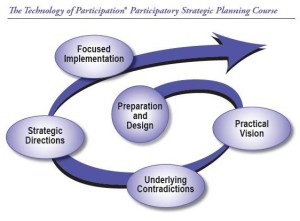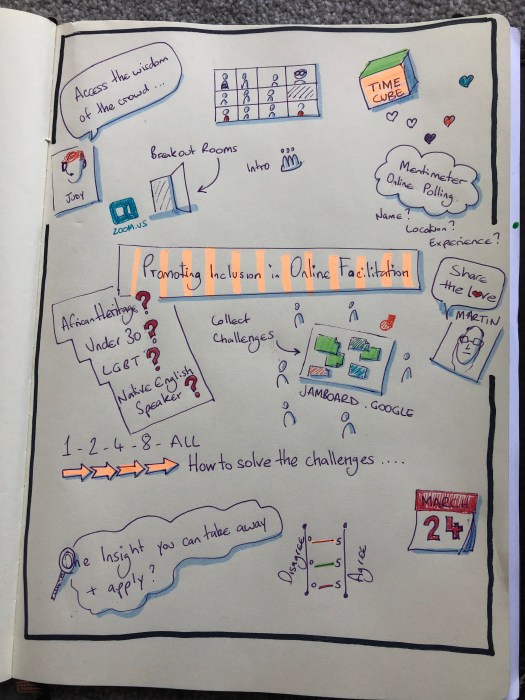 “What would it take for multiple and diverse stakeholders to align behind a complex and demanding change process, in a complex and demanding environment?” This was the question that intrigued me as I became engaged with the Oxfam Lebanon ‘One Country Strategy’ process.
“What would it take for multiple and diverse stakeholders to align behind a complex and demanding change process, in a complex and demanding environment?” This was the question that intrigued me as I became engaged with the Oxfam Lebanon ‘One Country Strategy’ process.
It was in September 2014 that I was approached to help with the design and facilitation of a ‘One Country Strategy’ (OCS) process for Oxfam in Lebanon.
 Fran Beytrison had recently taken up the role of Oxfam GB Country Director for Lebanon, after moving from the Internal Displacement Monitoring Centre (IDMC) in Geneva where she had participated in a strategic planning process that I had facilitated the previous year – see Transformational Strategy: from trepidation to ‘unlocked’.
Fran Beytrison had recently taken up the role of Oxfam GB Country Director for Lebanon, after moving from the Internal Displacement Monitoring Centre (IDMC) in Geneva where she had participated in a strategic planning process that I had facilitated the previous year – see Transformational Strategy: from trepidation to ‘unlocked’.
A complex and demanding context
Oxfam is one of the world’s largest and best-known international NGOs, founded in 1942 in Oxford in the UK. Today it comprises 17 national Oxfam Affiliates that are federated as Oxfam International and work in over 90 countries worldwide. It’s work includes emergency humanitarian relief, long-term development programmes and policy research and advocacy. It describes the scope of its work in terms of six key issues: active citizenship, gender justice, inequality and essential services, natural resources, saving lives and sustainable food.
Oxfam GB had launched a major emergency response to the Syria crisis in Lebanon in January 2013. Oxfam Novib and Oxfam Italia had been operating long term development programmes in Lebanon for some years before that. Oxfam GB’s Middle East regional Gender Justice programme was also located in Beirut, and Oxfam France and Oxfam Quebec were also involved in work in Lebanon.
By the autumn of 2014 it had become clear that an emergency humanitarian response could no longer be regarded as an adequate response to the ongoing and increasing effects of the Syria crisis in Lebanon. By then already over a million Syrian refugees were living among a pre-crisis population of around 4 million in Lebanon. Also in 2014 Oxfam International had launched a major organisational change process to achieve a new ‘2020 Vision’. This required a single ‘One Country Strategy’ to bring together the work of all Oxfam Affiliates in each country, as a first step toward to eventual merger as, for example, Oxfam Lebanon.
To plan and implement such a complex and demanding change process successfully, in the context of complex and demanding work in a complex and demanding environment, it was felt essential to effectively engage with all 150 or so in-country staff and other key stakeholders through a robust and professionally facilitated process.
The aims and scope of work
The Terms of Reference agreed for my role in October described the aims of the process to develop a One Country Strategy for Oxfam in Lebanon as threefold:
- to bring the three Oxfam affiliates operational in Lebanon and the Lebanon components of the Oxfam GB regional Gender Justice programmes together behind a single vision and shared operational plan, as a basis for moving to a country programme structure in line with the Oxfam 2020 Vision, while enabling other interested affiliates to engage as well
- to clearly detail a gender-mainstreamed One Programme approach (humanitarian, development and policy) as a means of improving programme quality and building a more integrated response, fully leveraging existing expertise across all relevant affiliates
- to position Oxfam as a leader in the increasingly consensual debate around a ‘Lebanese response’, as opposed to a ‘Syria response in Lebanon, through clear and evidence-based programmatic and policy shifts including strong sectoral leadership in key areas.
The process was therefore to guide both ‘technical visioning’ of Oxfam’s added value and role in Lebanon and organisational change to support implementation in the immediate and in the longer-term. It was to demonstrate a systematic, inclusive and participatory approach to strategic and operational planning and collaborative working, and so build shared commitment, confidence and trust for a new way forward together.
It was agreed to include also work with key actors within the country programme to develop skills for additional facilitation across various departments and sectors, particularly with a view to supporting the development of technical sectoral and departmental action plans in line with the broader Oxfam Country Strategy.
The contract allowed for up to 50 days’ work over six months from November to April, structured in four phases and including four trips to Lebanon. In the event my role required just 40 days’ work including three trips in November, December & January.
How the process unfolded
Phase 1 was conceived as a Preparation & Design phase. The aims were to develop a clear and agreed plan and budget for the process as a whole, and to develop shared clarity, confidence and commitment among staff and any other key stakeholders to the project and its 6-month timeframe.
A one-week trip in November allowed for a series of in-country consultation and process design meetings with large and small groups of staff of the various Oxfam affiliates in Lebanon, in Beirut and two field offices.
 The week included a one day OCS Orientation day for a cross-section of around 45 staff. The World Cafe method was demonstrated and applied to share questions, concerns and possibilities for the OCS process. The ToP Focused Conversation method was demonstrated and applied to introduce my own role as facilitator of the OCS process. The ToP Consensus Workshop method was demonstrated and applied to inform the design and delivery of the OCS process by agreeing “What do we need to take into account to ensure the success of this OCS process?”.
The week included a one day OCS Orientation day for a cross-section of around 45 staff. The World Cafe method was demonstrated and applied to share questions, concerns and possibilities for the OCS process. The ToP Focused Conversation method was demonstrated and applied to introduce my own role as facilitator of the OCS process. The ToP Consensus Workshop method was demonstrated and applied to inform the design and delivery of the OCS process by agreeing “What do we need to take into account to ensure the success of this OCS process?”.
The IDMC case study was used to outline the ToP Particpatory Strategic Planning process that would provide a framework for the OCS process as a whole. A project steering committee of 6-8 staff was established, to act as a soundboard and guide to the design process and oversee subsequent implementation.
Additional remote consultation was conducted with stakeholders based outside Lebanon. All the questions, concerns and aspirations raised during this first phase were documented and reviewed with the steering committee, and helped to informed the design and delivery of the remaining phases.
 Phase 2 was conceived as the Launch phase. The ‘rational’ aim was to develop a clear and agreed strategic framework as a basis for the single country strategy. This was to include an analysis of the changing strategic context; Practical Vision, Underlying Contradictions and Strategic Directions of the ToP Participatory Strategic Planning process; and a 3-month action plan for completion of the strategy. The ‘experiential’ aim was again to develop shared clarity, confidence and commitment among staff and any other key stakeholders, this time to the emerging strategy and the plan for its completion.
Phase 2 was conceived as the Launch phase. The ‘rational’ aim was to develop a clear and agreed strategic framework as a basis for the single country strategy. This was to include an analysis of the changing strategic context; Practical Vision, Underlying Contradictions and Strategic Directions of the ToP Participatory Strategic Planning process; and a 3-month action plan for completion of the strategy. The ‘experiential’ aim was again to develop shared clarity, confidence and commitment among staff and any other key stakeholders, this time to the emerging strategy and the plan for its completion.
By this stage the steering group had clarified the ‘Focus Question’ for the overall strategic planning process as: “What can we do over the next 5 years as one Oxfam in Lebanon working with others to address suffering and inequality in Lebanon?”
A 10-day trip in December allowed for the preparation and facilitation of a 4-day OCS Launch Week event, involving a series of sessions with different sub-groups.
 The morning of Tuesday’s ‘Consultation Day’ involved key staff and external stakeholders invited for their knowledge and experience of Oxfam Lebanon’s changing strategic context. The ToP ‘Wave’ exercise was used to chart and analyse trends, ‘on the horizon, emerging, peaking and dying’, to inform the subsequent strategic planning process.
The morning of Tuesday’s ‘Consultation Day’ involved key staff and external stakeholders invited for their knowledge and experience of Oxfam Lebanon’s changing strategic context. The ToP ‘Wave’ exercise was used to chart and analyse trends, ‘on the horizon, emerging, peaking and dying’, to inform the subsequent strategic planning process.
The afternoon of the Consultation day involved around 150 staff of the various Oxfam affiliates in Lebanon plus key regional staff and local partners. The World Cafe method was used to enable this larger group (in 15 tables of 10, each including a team of 3 conversation hosts) to deliberate and to share responses to the three ‘focus questions’ that would guide the consensus building and strategy building for the remainder of the week:
 Practical Vision: “What would we like to see in place in 5 years’ time, as a result of the work of Oxfam in Lebanon?” (indicators of external impact and internal effectiveness)
Practical Vision: “What would we like to see in place in 5 years’ time, as a result of the work of Oxfam in Lebanon?” (indicators of external impact and internal effectiveness)- Current reality: “What in our current reality is blocking us from realising our Vision?” (both internal & external to Oxfam Lebanon) “What strengths do we have to address these obstacles?”
- Strategic Directions: “What practical projects or initiatives over the next 5 years could address these obstacles and help to realise our Vision?”
The remaining three days involved a cross-section of around 45 staff, each of whom had hosted one of the three World Cafe conversations at the 15 tables of 10 on Tuesday. Each day involved an extended and adapted ToP Consensus Workshop process. First in groups of six, pairs of table host teams reviewed and clustered the ideas that they had harvested from their World Cafe table conversations on the question for that day – Practical Vision, Current Reality or Strategic Directions. Second, each Oxfam affiliate, field office, department and programme team met separately to add any further ideas from their own distinct perspective that they felt may not yet have been adequately reflected in the ideas shared. Third, the whole group of 45 worked together for most of the afternoon to weave all the ideas generated into clusters, and to name the emerging consensus. Finally, at the end of the week, outline action plans were agreed by work team for communicating the outcomes to those not present, and engaging with them over the coming weeks and months in finalising the framework and planning for implementation.
Strategic deployment of breaks and energisers helped to just about sustain the group’s energy throughout the week – to deal with large volumes of complex data, and to build consensus on often contentious issues among a group that was itself in many ways reflective of the diversity of perspectives and interests at play in Oxfam’s humanitarian, development and advocacy work in Lebanon.
A brief review of Oxfam International’s global change goals just before the naming of Strategic Directions enabled the group to align their names with Oxfam’s global strategy without having been overly constrained by them in their own visioning or in their analysis and response to their own local and regional realities. The outcome was four Strategic Directions, each articulated by a number of distinct ‘strategic intents’, designed to collectively address the Underlying Contradictions to the Practical Vision:
- Designing and implementing integrated & effective, rights-based humanitarian & development programmes
- Working with others to achieve high quality programmes
- Investing in staff
- Influencing to create change from the local to the global.
Doubtless the steering committee or Fran alone might have developed a very similar framework without such an elaborate and inclusive engagement process, but of course the experiential aims of shared clarity, confidence and commitment were central and critical to the OCS process. Feedback indicated that the group had indeed found the week long and tiring, and in some cases it was felt that key issues or perspectives had not been adequately addressed or not in proper proportion. Nevertheless it was clear that the visual and participatory approach had been appreciated, and the open and frank discussions, diversity in participation and perspectives, and the clarity and consensus achieved. Fionna Smyth, then Oxfam GB Regional Campaigns and Policy Manager for the Middle East, Eastern Europe and CIS, commented recently on LinkedIn:
“I was at this particular meeting and it really was a phenomenal experience. It developed a clear vision, and was inclusive of many diverse voices. I loved Martin’s approach.”
By the end of the week, it was high time to enjoy the staff Christmas party! Having documented each workshop on the day, in preparation for the next day’s workshop, it was then a simple matter to compile a first draft OCS strategic framework document for circulation and feedback between December and January.
Phase 3 was originally conceived to include the resolution of any key issues in finalising the strategy document for approval in April, and development of clear and agreed (and comprehensive) operational plans for implementation of the first year of the new strategy. The ‘experiential’ aim again was to promote shared clarity, confidence and commitment among staff and other key stakeholders to the emerging strategy, and also now to plans for its completion and implementation.
It was agreed with the steering group after the Launch Week, however, that to continue such a comprehensive approach with such broad engagement could be asking too much of the staff in the midst of the many other demands on their time and energy. Moreover, on reflection, it was felt that some areas of programming and organisational change could benefit more than others of facilitation support to enable effective engagement and an appropriate and successful implementation planning process.
For these reasons it was agreed switch from a comprehensive to a targeted approach to facilitation support in the implementation planning. Instead of working again with a cross-section of the whole staff on planning the whole of the implementation together, I would work with key stakeholders in three particular programme areas to apply the new strategic framework to tailored planning implementation in those particular areas. Also I would offer ToP Group Facilitation Methods training to a cadre of 30 staff and partners from across the work teams and affiliates. These two elements became the twin focus of a two-week trip to Beirut in January.
Phase 4 had been conceived to allow for a collective review of experience and learning from the project and first quarter implementation, and to agree clear 90-day workplans for the second quarter, with the experiential aim of consolidating pride in the strategy and support for the structural merger. However we had already transitioned from a comprehensive and collective approach in phase 3, to an approach in which the (already somewhat restructured) work teams were able to integrate the agreed new strategic framework in their operational work planning and in their longer-term programme development work. Much had changed meanwhile as well in the strategic context, not least in the the Syria crisis itself and in its unfolding impact in Lebanon. For these various reasons a fourth trip was not felt necessary, and my own role in the OCS project was concluded.
As it turned out, I made another two trips to Beirut for another client in May and June of 2015, to design and facilitate a participatory strategic planning for the Safety & Security Committee for Lebanon of which Oxfam is a member. It was a pleasure to be able to reconnect with some of the Oxfam team while I was there, and learn something of what had happened next in the OCS process. That, however, is another story…
See also about me, how I work, who I work with and recommendations & case studies, and please contact me about how we might work together.
Register now on Eventbrite for my free facilitation webinars, and for my regularly scheduled ToP facilitation training courses in London and Brussels.
Like this:
Like Loading...
 Monday, 11 September 2023 – 1.00-2:30pm UK time
Monday, 11 September 2023 – 1.00-2:30pm UK time These are the questions that have guided my exploration of feminist, anti-racist and anti-oppressive facilitation this past couple of years. For more on that, see Exploring feminist facilitation.
These are the questions that have guided my exploration of feminist, anti-racist and anti-oppressive facilitation this past couple of years. For more on that, see Exploring feminist facilitation.




 “What would it take for multiple and diverse stakeholders to align behind a complex and demanding change process, in a complex and demanding environment?” This was the question that intrigued me as I became engaged with the Oxfam Lebanon ‘One Country Strategy’ process.
“What would it take for multiple and diverse stakeholders to align behind a complex and demanding change process, in a complex and demanding environment?” This was the question that intrigued me as I became engaged with the Oxfam Lebanon ‘One Country Strategy’ process.



